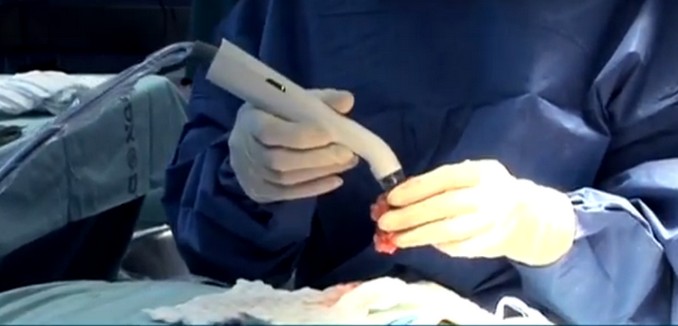Clinical trials of a revolutionary Israeli device have shown that the device cut the need for repeat surgeries by 50 percent for women who undergo lumpectomies, a procedure to remove breast tumors, The Times of Israel reported Thursday.
MarginProbe, made by Israel-based Dune Medical Devices, allows a surgeon to examine cancerous tissue removed from a breast to ensure that there are no malignant cells on its outer boundaries. The pen-like probe reads electromagnetic waves from the tissue and indicates on an attached console whether or not its edges are healthy. The surgeon can remove more tissue as needed to ensure the affected area is clear of malignant cells before closing the patient up.
Without MarginProbe, surgeons do not have an immediate way to detect cancer cells on the margins of a tissue sample and must send it to a lab. Lab results can take a few weeks, and if they come back positive — as one in four samples do — patients will need to undergo a second surgery.
“We have developed the only technology in the world that has a commercial product that allows surgeons in operating rooms, in real time, to check the margins of the tumor, identify cancerous tissue and decide on the spot if more tissue needs to be removed or not,” Gal Aharonowitz, general manager in charge of Israeli operations, told the Times.
MarginProbe, which won FDA approval in 2012, is used in more than 100 hospitals in the United States and 12 in Israel. Its usage in commercial settings has seen a reduction in repeat surgeries by as much as 80 percent.
Dune Medical is currently in talks with Israel’s Health Ministry to adopt MarginProbe as a standard of care. This would allow hospitals to be reimbursed for its usage, leading to wider adoption in Israel.
According to Aharonowitz, each surgery requires a new probe, which costs $1,000 in the U.S. and isn’t typically covered by insurance. While the cost can be prohibitive, a repeat surgery could run between $6,000 to $9,000, a recent Wall Street Journal article noted.
Dr. Tanir Alweis, a breast surgeon and medical director at the Sarah Markowitz Breast Health Center at Kaplan Medical Center in Rehovot, has used the device on roughly 100 patients and described it as “very, very user friendly.”
While Alweis acknowledged that MarginProbe occasionally returned false positives — indicating cancerous cells when later lab work showed that they were not present — she said that “false positives are a small price to pay for the improvement in the re-operation rate.” The trade-off, Alwees said, “is worth it.”
Dr. Alice Police, a breast cancer surgeon at UC Irvine Health who performs about 300 surgeries annually, said in a video at Dune’s website, “I think it is the biggest advancement in breast cancer surgery in a generation.”
“When we have to tell a patient that they need a second surgery because the margins aren’t clear from the first surgery, it is just devastating for the patient psychologically,” she added.
In the video embedded below, three doctors explain how MarginProbe works and the benefits it provides.
[Photo: Dune Medical Devices – International / YouTube ]




